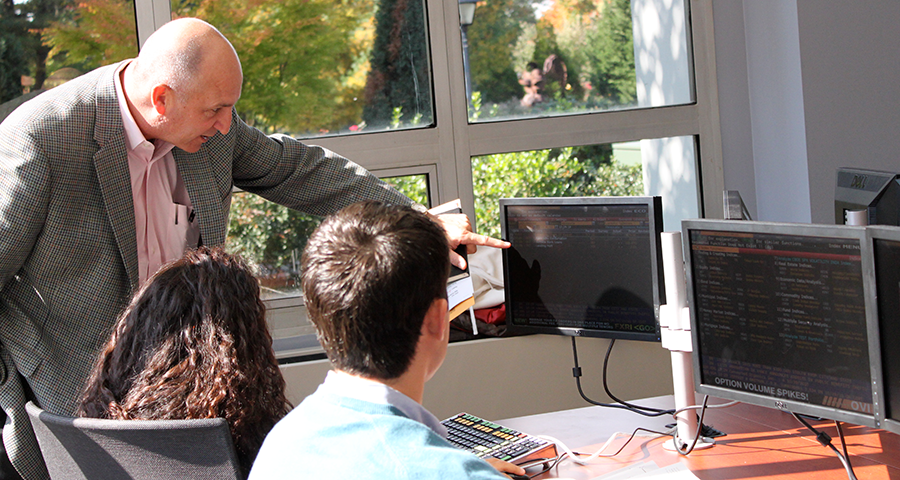Insider information from a Wall Street veteran who now teaches in the Robert B. Willumstad School of Business
What were some early influences on you?
The 1960s left a big impression on me. My father was a World War II Navy veteran and worked for the phone company for 40 years before he retired. One thing he was adamant about was standing up to bullies. Not necessarily fighting authority, because that was the last thing he wanted, but not allowing yourself or anyone else to be bullied or pushed around. That is a lesson I carried with me through adulthood.
Why did you decide to attend the U.S. Merchant Marine Academy?
When I graduated from high school in 1978, there were some financial constraints in my family and my college choices were narrowed to any school I wanted to attend, as long as it was free. With my family background, there was a strong emphasis placed on going to a military academy because it was a quality education, essentially for free.
How did you get your start on Wall Street?
In 1982, when I graduated from SUNY Maritime, we were in the midst of a short-lived but very deep recession. The shipping industry had dried up. I was hanging around, living at home, bartending, coaching basketball and doing nothing constructive. At the urging of my parents, I started looking for a real job. Someone I knew from coaching basketball and from around town suggested I go for an interview at E.F. Hutton. I went and was offered a job. After becoming friendly with the people I worked with, I heard that you could make hundreds of thousands of dollars a year. I had never heard of anyone making that kind of money. I told myself then, “I don’t know what this is, but I’m going to figure it out.”
Besides the money, what intrigued you about Wall Street?
I loved the pace. As a trader I didn’t have to prepare cases that were going to go to court in six months or a year. I didn’t have to write papers that were due in three months. I went in every single day with a clean slate. My goal was to generate commissions for the firm I worked for, and I found I was good at it. I could focus on a lot of different things at once. It fit my personality well. The people I worked with were great, and it was just a lot of fun for a long time.
What did you look for in the traders you hired?
On a trading desk, you spend a lot of time with someone. You’re literally shoulder to shoulder for 10 to 12 hours a day, oftentimes for dinners into the evening, and you travel together. You didn’t have to be able to split the atom to trade stocks, but you had to have reasonable intelligence as evidenced by a college degree. But the question I would always ask myself is, “If I have to spend 11 hours a day with this person, is that going to be okay?” It was less about native intelligence than just how you got along with people.
Trading has lots of ups and downs. How do you keep your cool in a stressful environment?
I react to things quickly, and I’m hard-pressed to consider myself as remaining calm. But, in a funny way, when things were at their worst, was when I was at my best. My trial by fire was the crash of ’87. I was 26 years old, and it was the single biggest trading day I ever had. I made over three million dollars trading that day. After that, I remember thinking to myself, when things were at their worst— whether it was an outbreak of war or market crisis—everybody in this massive trading room was looking at me so it’s critically important how I carry myself. Whether it’s an athletic contest or busy trading day, when things are at their craziest, is when you want to slow everything down.
What are the most important lessons you try to impart to your Adelphi students now?
When I got into the world of business, I knew nothing. I didn’t know how to act, how to dress. A lot of the students that I see at Adelphi are the first ones in their families to go to college. I try to show them how the game is played. I show them the things that no one showed me. I like to think that, from my experiences, I have the ability to give them a little bit of what they have to know to navigate in the business world.

For further information, please contact:
Todd Wilson
Strategic Communications Director
p – 516.237.8634
e – twilson@adelphi.edu